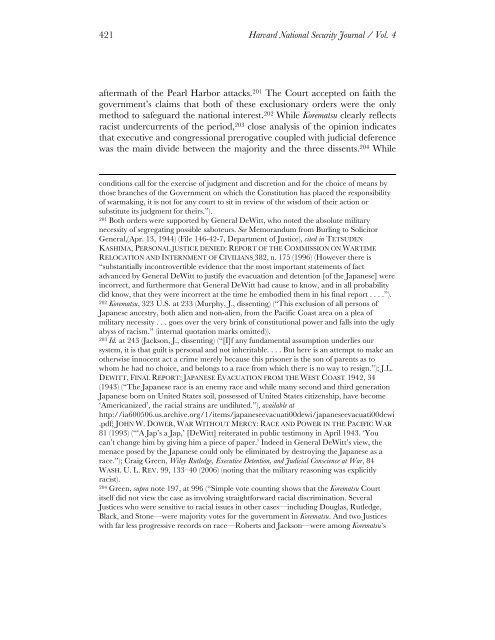Vo.4-Moshirnia-Final
Vo.4-Moshirnia-Final
Vo.4-Moshirnia-Final
Create successful ePaper yourself
Turn your PDF publications into a flip-book with our unique Google optimized e-Paper software.
421 Harvard National Security Journal / Vol. 4<br />
aftermath of the Pearl Harbor attacks. 201 The Court accepted on faith the<br />
government’s claims that both of these exclusionary orders were the only<br />
method to safeguard the national interest. 202 While Korematsu clearly reflects<br />
racist undercurrents of the period, 203 close analysis of the opinion indicates<br />
that executive and congressional prerogative coupled with judicial deference<br />
was the main divide between the majority and the three dissents. 204 While<br />
conditions call for the exercise of judgment and discretion and for the choice of means by<br />
those branches of the Government on which the Constitution has placed the responsibility<br />
of warmaking, it is not for any court to sit in review of the wisdom of their action or<br />
substitute its judgment for theirs.”).<br />
201 Both orders were supported by General DeWitt, who noted the absolute military<br />
necessity of segregating possible saboteurs. See Memorandum from Burling to Solicitor<br />
General,(Apr. 13, 1944) (File 146-42-7, Department of Justice), cited in TETSUDEN<br />
KASHIMA, PERSONAL JUSTICE DENIED: REPORT OF THE COMMISSION ON WARTIME<br />
RELOCATION AND INTERNMENT OF CIVILIANS 382, n. 175 (1996) (However there is<br />
“substantially incontrovertible evidence that the most important statements of fact<br />
advanced by General DeWitt to justify the evacuation and detention [of the Japanese] were<br />
incorrect, and furthermore that General DeWitt had cause to know, and in all probability<br />
did know, that they were incorrect at the time he embodied them in his final report . . . .”).<br />
202 Korematsu, 323 U.S. at 233 (Murphy, J., dissenting) (“This exclusion of all persons of<br />
Japanese ancestry, both alien and non-alien, from the Pacific Coast area on a plea of<br />
military necessity . . . goes over the very brink of constitutional power and falls into the ugly<br />
abyss of racism.” (internal quotation marks omitted)).<br />
203 Id. at 243 (Jackson, J., dissenting) (“[I]f any fundamental assumption underlies our<br />
system, it is that guilt is personal and not inheritable. . . . But here is an attempt to make an<br />
otherwise innocent act a crime merely because this prisoner is the son of parents as to<br />
whom he had no choice, and belongs to a race from which there is no way to resign.”); J.L.<br />
DEWITT, FINAL REPORT: JAPANESE EVACUATION FROM THE WEST COAST 1942, 34<br />
(1943) (“The Japanese race is an enemy race and while many second and third generation<br />
Japanese born on United States soil, possessed of United States citizenship, have become<br />
‘Americanized’, the racial strains are undiluted.”), available at<br />
http://ia600506.us.archive.org/1/items/japaneseevacuati00dewi/japaneseevacuati00dewi<br />
.pdf; JOHN W. DOWER, WAR WITHOUT MERCY: RACE AND POWER IN THE PACIFIC WAR<br />
81 (1993) (“‘A Jap’s a Jap,’ [DeWitt] reiterated in public testimony in April 1943. ‘You<br />
can’t change him by giving him a piece of paper.’ Indeed in General DeWitt’s view, the<br />
menace posed by the Japanese could only be eliminated by destroying the Japanese as a<br />
race.”); Craig Green, Wiley Rutledge, Executive Detention, and Judicial Conscience at War, 84<br />
WASH. U. L. REV. 99, 133–40 (2006) (noting that the military reasoning was explicitly<br />
racist).<br />
204 Green, supra note 197, at 996 (“Simple vote counting shows that the Korematsu Court<br />
itself did not view the case as involving straightforward racial discrimination. Several<br />
Justices who were sensitive to racial issues in other cases—including Douglas, Rutledge,<br />
Black, and Stone—were majority votes for the government in Korematsu. And two Justices<br />
with far less progressive records on race—Roberts and Jackson—were among Korematsu’s
















